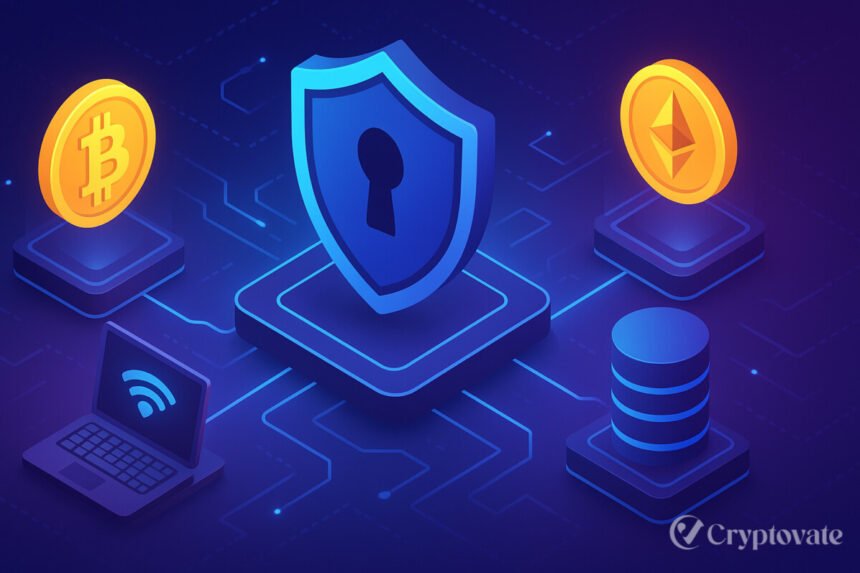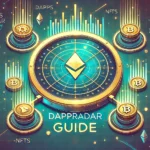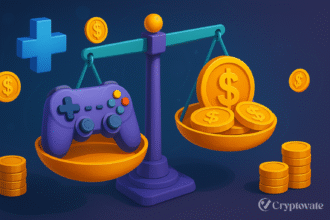– Ad –
The VPN landscape just hit some eye-popping numbers. In 2025, the global VPN market is projected to reach $71.66 billion, growing 16.7% from $61.4 billion in 2024. On top of that, decentralized VPNs (dVPNs) grew a massive 340% last year in regions with tight censorship, Axis Intelligence report. That’s not a fluke, it’s a wave. Let’s break it down.
What is a decentralized VPN?
A decentralized VPN is like a blockchain-powered onion network where your data hops through peers instead of centralized servers. You pay node operators in crypto or tokens. No central points means fewer logs, zero shutdown risk, and big wins for privacy.
But here’s the catch: they’re still early stage. Adoption stats show explosive growth, led by privacy-conscious regions, but it’s not mainstream yet. Think of it like raw crypto: fascinating, promising, but not polished.
Pros of dVPNs
- Stronger decentralization & privacy
No central server = no single failure point. It’s hard for governments or big corporations to subpoena logs from a decentralized network.
- Cryptoeconomic incentives
Nodes get paid via micropayments or tokens, which encourages honest participation. Smart contracts help automate trust.
- Censorship resistance
A dispersed network means it’s tougher to block, great for users in China, Iran, or other restricted countries.
Cons & Risks of dVPNs
- Performance isn’t top‑tier yet.
Real-world tests show slower speeds and higher latency compared to traditional VPNs, especially when using mixnets like Nym.
- Trust issues with node operators
You never know who’s behind the node; the risk of malicious or careless operators exists.
- Scalability & legal challenges
These systems are early-stage. Regulators could target node operators, and scaling to mainstream user levels isn’t trivial.
Decentralized VPN vs VPN
dVPNs vs VPNs come down to use case:
| Feature | Centralized VPN | Decentralized VPN (dVPN) |
| Control | Company-managed servers | Peer-to-peer, no central control |
| Logging | Potential logging | Minimal or zero logs |
| Performance consistency | High, optimized | Varies per user/node |
| Censorship resistance | Moderate | High, uncensorable network paths |
| Maturity | Very mature | Early-stage |
For example, Nym mixnet, an open-source dVPN, provides exceptional anonymity. But tests show noticeable lag for video streaming or gaming.
Also Read: Jack Dorsey’s Bitchat: Decentralized Messaging Revolution
Best decentralized VPNs in 2025
Top names leading the pack include:
- NymVPN – A mixnet backed by nodes that shuffle and pad your traffic; strong on anonymity, slower on speed.
- Mysterium Network, HOPR, Orchid, Deeper Network – All open-source, peer-to-peer, blockchain‑powered.
- Sentinel – A rising dVPN, hit 31,600 unique users in just one week in early 2025, processing over 60 TB of data . That’s real momentum, but it’s still niche compared to mass‑market VPN giants like Nord or Proton.
Are decentralized VPNs worth it?
Short answer? Depends.
- Privacy warriors & anti-censorship activists: Hell yes. dVPNs add real layers of protection and resistance.
- Casual users: Probably not yet, speed gaps and UX friction make centralized VPNs a smoother bet.
- Tech enthusiasts: Great for experimentation. Just be ready for quirks and extra setup.
What this means is that dVPNs are a niche rising fast, but not ready to dethrone traditional VPNs as your everyday tool.
The Future Outlook
Expect adoption to grow. Per the growth market report, the dVPN market is expected to expand at a 19–20% CAGR from 2025 to 2033. Centralized giants like Proton and Nord are even experimenting with hybrid setups to blend privacy features and decentralized infrastructure. What this means is: the dVPN field isn’t a gimmick, it’s shaping into a legit alternative. But mainstream-ready? We’re not quite there yet.
Final Verdict
Decentralized VPNs are exciting and increasingly viable as privacy tools. The decentralized VPN market is booming, yet it still needs time to catch up with its centralized counterparts on speed, ease, and trust.
If safeguarding your identity from surveillance or censorship is top priority, dVPNs should be on your radar. For everything else, traditional VPNs remain your best bet, for now.
FAQs
What makes decentralized VPNs different from traditional VPNs?
Decentralized VPNs (dVPNs) use peer-to-peer networks instead of centralized servers, reducing logging and enhancing censorship resistance. Traditional VPNs rely on company-controlled servers, offering consistent performance but potential logging risks.
Are decentralized VPNs faster than traditional VPNs?
Not yet. dVPNs often have slower speeds and higher latency due to their early-stage tech and peer-based routing, unlike the optimized servers of traditional VPNs.
Who should use a decentralized VPN?
dVPNs are ideal for privacy advocates and users in censored regions. Casual users may prefer traditional VPNs for better speed and ease of use.
Are decentralized VPNs safe to use?
dVPNs offer strong privacy with minimal logging, but risks remain with potentially malicious node operators. Always research the network before using.


















